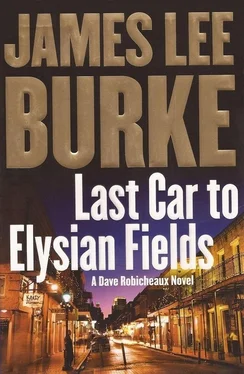He had just lectured a tormented man on his violence, although he, Jimmie Dolan, had just profited from it, and if truth be known he was glad he was on the street and perhaps secretly glad his false accusers had gotten their just deserts.
Better to marry than to burn, St. Paul had said. Better to be a bourbon priest or a diocesan sycophant than a self-canonized fool, Father Jimmie thought.
“What do you think, Snuggs?” he said.
Snuggs answered by nudging his head into Father Jimmie’s chin.
Father Jimmie went into the bedroom, flung his clothes in the corner, and got under the shower. The water coughed in the pipes, then seemed to whisper the word hypocrite in his ear.
The South has changed dramatically since the civil rights legislation of the 1960s. Anyone who says otherwise has either not been there or wishes to keep old wounds green and tender as part of a personal agenda. And nowhere has the change been more visible than in the once recalcitrant states of the Deep South.
But that evening, when I took Clotile Arceneaux to supper on East Main, I tried to convince myself otherwise. I told myself the furtive glances at our table, the awkwardness of friends who felt they should stop by and say hello, were expressions of narrowness and latent racism to be expected in our culture.
The truth was no one took exception to Clotile’s race. But they did take exception to my being out with another woman in less than a year of Bootsie’s death.
It had turned cold again when we left the restaurant. Stars were spread across the sky, the horizon flaring with stubble fires, smoke boiling out of the electric lights at the sugar mills.
“You a little uncomfortable in there about something?” Clotile asked.
“Not me,” I replied.
She opened the door to my pickup by herself and got in and closed it behind her, although I had tried to help her in. “You’re really out of the past, aren’t you?” she said.
“Probably,” I said.
She smiled and didn’t say anything. We drove toward the drawbridge and the theater complex on the other side of Bayou Teche. She had checked in to a motel out by the four-lane that afternoon.
We crossed the bayou and turned in to the theater parking lot. It was filled with teenagers, long lines of them extending out from the ticket windows.
“Friday night is a bad night for the movies here,” I said.
“We don’t need to go,” she said, looking straight ahead.
I turned around in the parking lot, recrossed the bayou, and drove up East Main, without destination. The street seemed strangely empty, the stars shut out by the canopy of oaks overhead, my rented shotgun house dark and blown with un raked leaves. I hesitated, then pulled into my driveway and cut the engine. The ground fog in the trees and bamboo glistened in the lights from City Park across the bayou.
“Where’s Father Dolan?” she asked.
“Staying with friends in Lafayette.”
“You have a lot of regrets in your life, Robicheaux?” she said.
“All drunks do,” I replied.
“How do you deal with them?”
“I don’t labor over them anymore.”
She still looked straight ahead. “I don’t want to be a regret in somebody’s life,” she said.
“Want to meet my cat?” I said.
And that’s what we did. I introduced her to Snuggs; then we ate ice cream in the kitchen and I drove her to her motel.
Afterward I went to the cemetery in St. Martinville and sat on the steel bench by Bootsie’s tomb and watched the moon rise over the old French church on the bayou.
That night I dreamed I was in New Orleans in an earlier era, riding on a streetcar out to Elysian Fields. The streets were dark, the palm fronds on the neutral ground yellow with blight. No one else was on the car except the motorman. When he turned and looked back at me his eyes were empty sockets, the skin on his face dried and shrunken into little more than gauze on his skull.
Oftentimes police cases are not solved. They simply unravel, by chance and accident. With good luck there will even be an appreciable degree of justice involved, although it often originates from an expected source.
Early the next morning, Saturday, my lawn was white with frost and the bamboo on the side of the house was stiff and hard and rattled like broomsticks in the wind. I put on my sweat suit, ran three miles through City Park, then showered and drove down to Clete’s cottage in the motor court.
He sat on the side of his bed in the coldness of the room, sleepy, shivering slightly, wearing only a strap undershirt and pajama bottoms.
The wastebasket in his kitchen was stuffed with fast-food containers and beer cans.
“You want to do what?” he said.
“Eat breakfast at McDonald’s, then maybe knock down some ducks at Pecan Island,” I said.
“I’m busy today,” he replied.
“I see.”
It was quiet in the room. His eyes lingered on mine. “What’s bothering you, big mon?” he said.
I told him about the dream, the motorman with the skeletal face, the darkness outside the streetcar, the yellowed palm fronds that clattered like bone. “You ever have a dream like that?” I said.
“I used to dream I was on a Jolly Green that was going down. But that was in the hospital in Saigon. It doesn’t mean anything. It’s just a dream.”
“I can’t shake it,” I said.
He got up from the bed and began dressing. “Turn on the heat, will you? It feels like it’s thirty below in here,” he said.
We ate at the McDonald’s on East Main. Outside, the sky was blue, the leaves of the live oak in the adjacent lot flickering in the sunlight.
“Can’t tempt you into a duck-hunting trip?” I said.
He wiped his mouth with a crumpled napkin and dropped it onto his plate. “That perv I told you about, Bobby Joe Fontenot, the one in the trailer court? I couldn’t stop thinking about what he said to me.”
“Said what?”
“That if he re offended he was going to use my name every time he stuck it to a little kid. So I called the perv’s P.O. Guess what? The P.O. is on vacation. So I told the guy handling his case file about the little boy in the trailer next door. He did everything except yawn in my ear.”
“Call Social Services,” I said.
“I already did. I think that kid is shark meat.”
He gathered up the trash from both our meals and stuffed them angrily into a bin.
“Take it easy, Cletus,” I said.
“Screw the ducks. Time to spit in the punch bowl,” he said.
The mother of the little boy in the trailer court was named Katie Goltz. She sat with us in her tiny living room, still not connecting the reasons we were there, even though Clete mentioned he had been chasing down a bail skip who was the fall partner of Bobby Joe Fontenot, a convicted sex predator living next door.
She wore no lipstick, old jeans, Indian moccasins, and a colorless pullover. Her hair was cut short, and had probably been brown before it was peroxided and waved on one side to resemble a 1940s leading lady’s.
“Where’s your son?” Clete said.
“At the strip mall,” she replied.
Clete nodded. “He went with some friends?” he asked.
“Bobby Joe took him. To buy him a comic book for helping clean his trailer,” she said.
Clete leaned forward in his chair. “Ma’am, we have a Meagan’s Law in Louisiana. You must have been notified about Bobby Joe Fontenot’s record,” he said.
“People change,” she said.
“You listen to me. That guy is a degenerate. You keep your son away from him,” Clete said.
She focused her eyes on a neutral space, her hands folded in her lap.
Her arms were muscular, as though she had grown up doing physical work, her complexion clear. Behind her, framed on the wall, was a black-and-white photograph of her and a man who looked like a power lifter. His hair was shaved on the sides, curly in back, his face impish, like a cartoon drawing of a monkey’s.
Читать дальше












